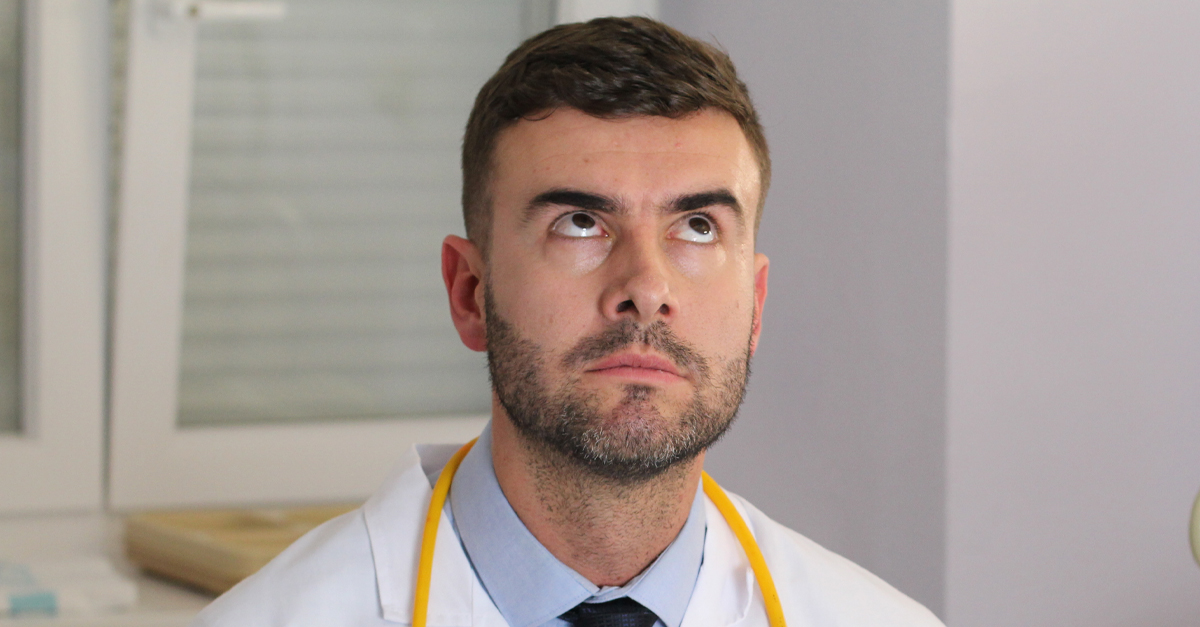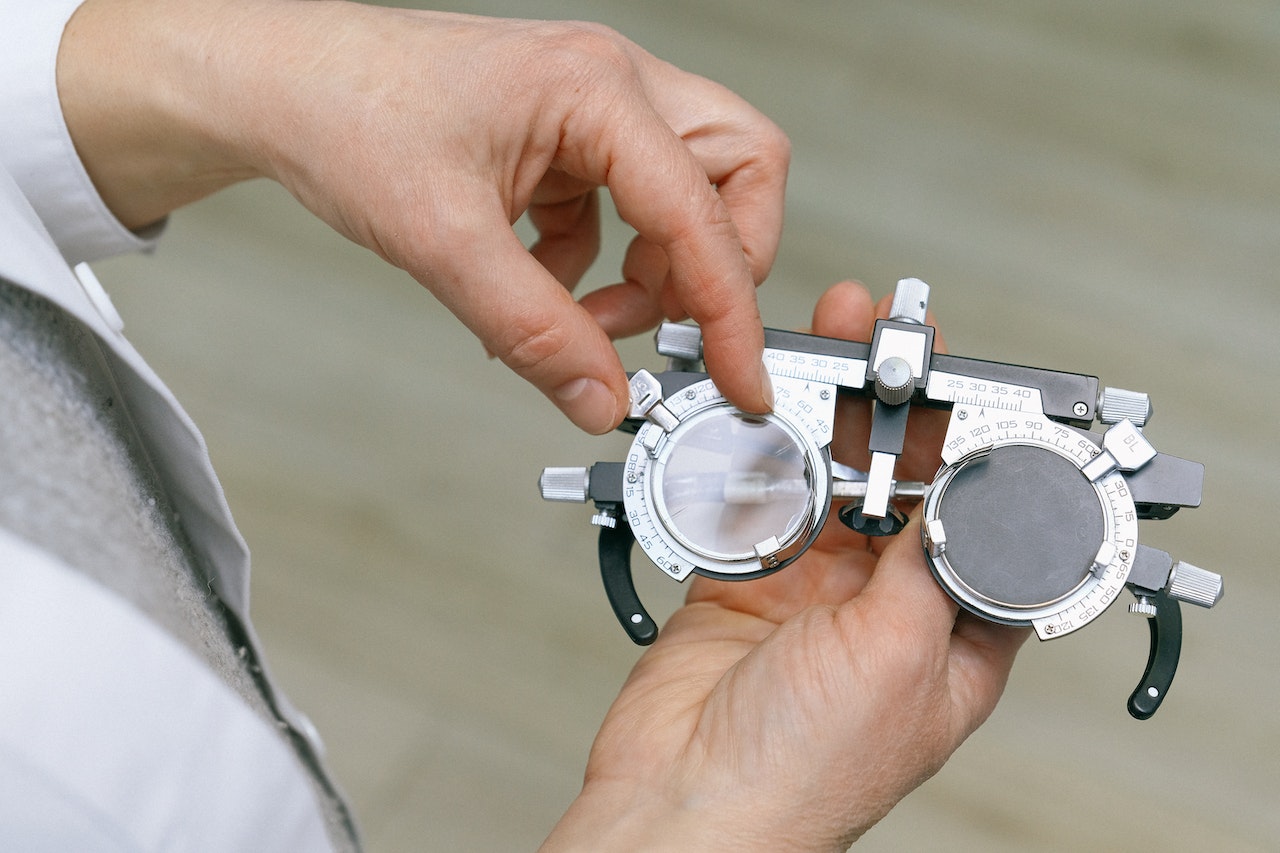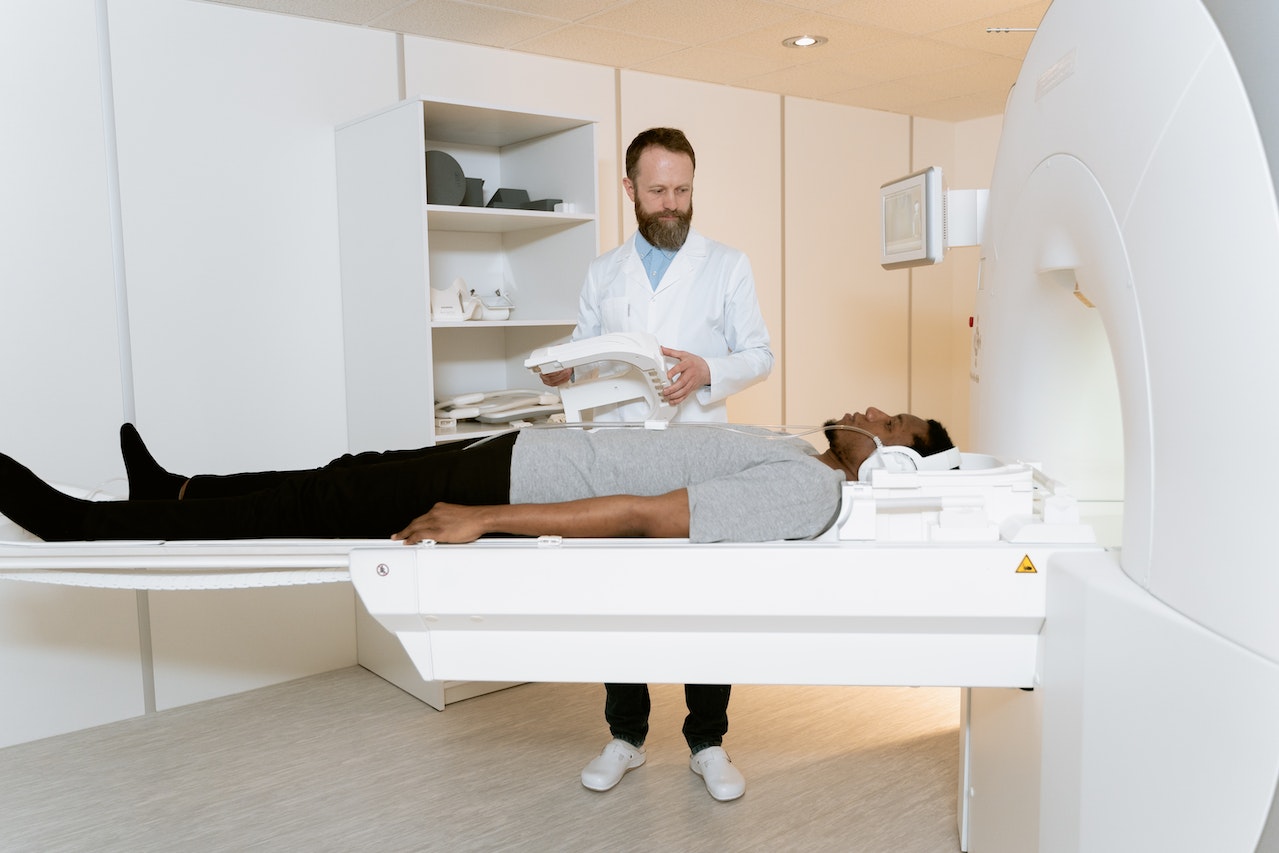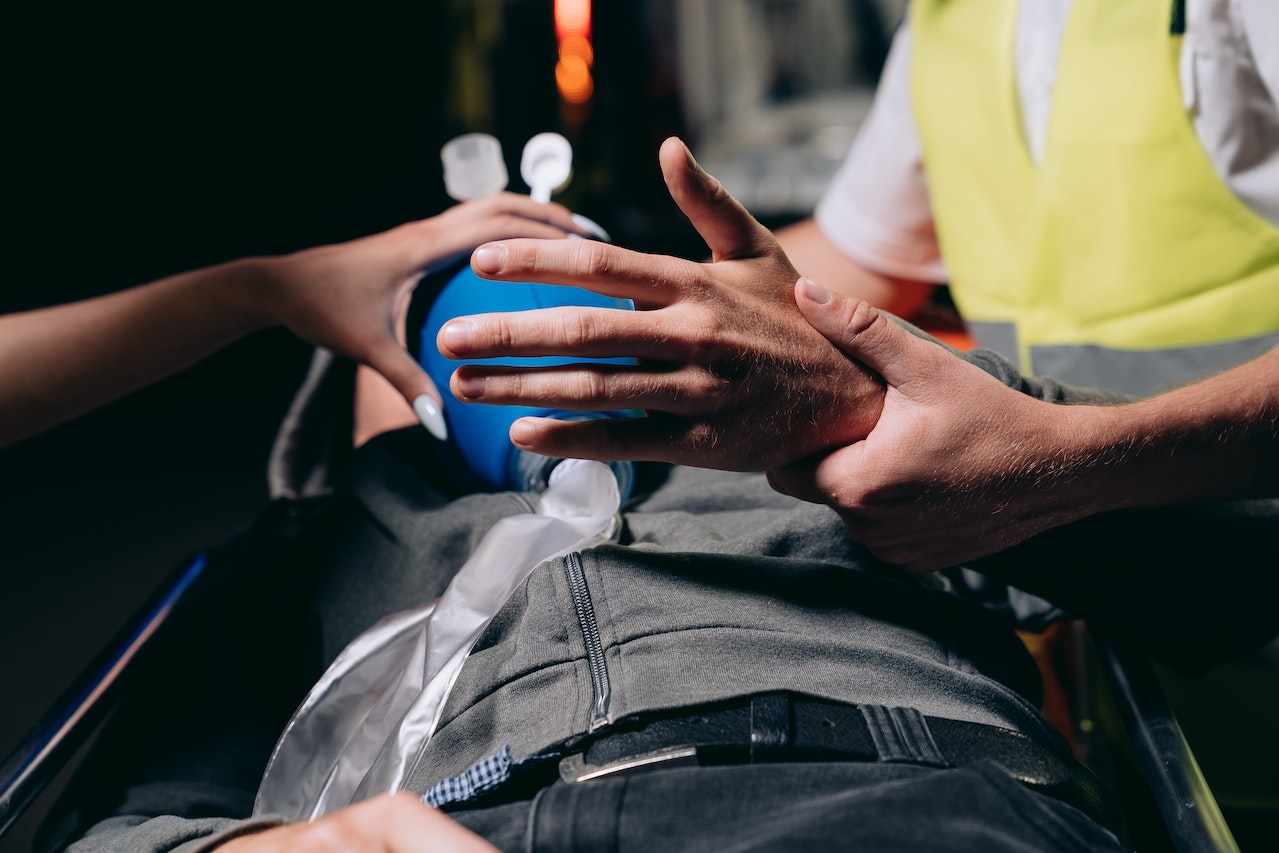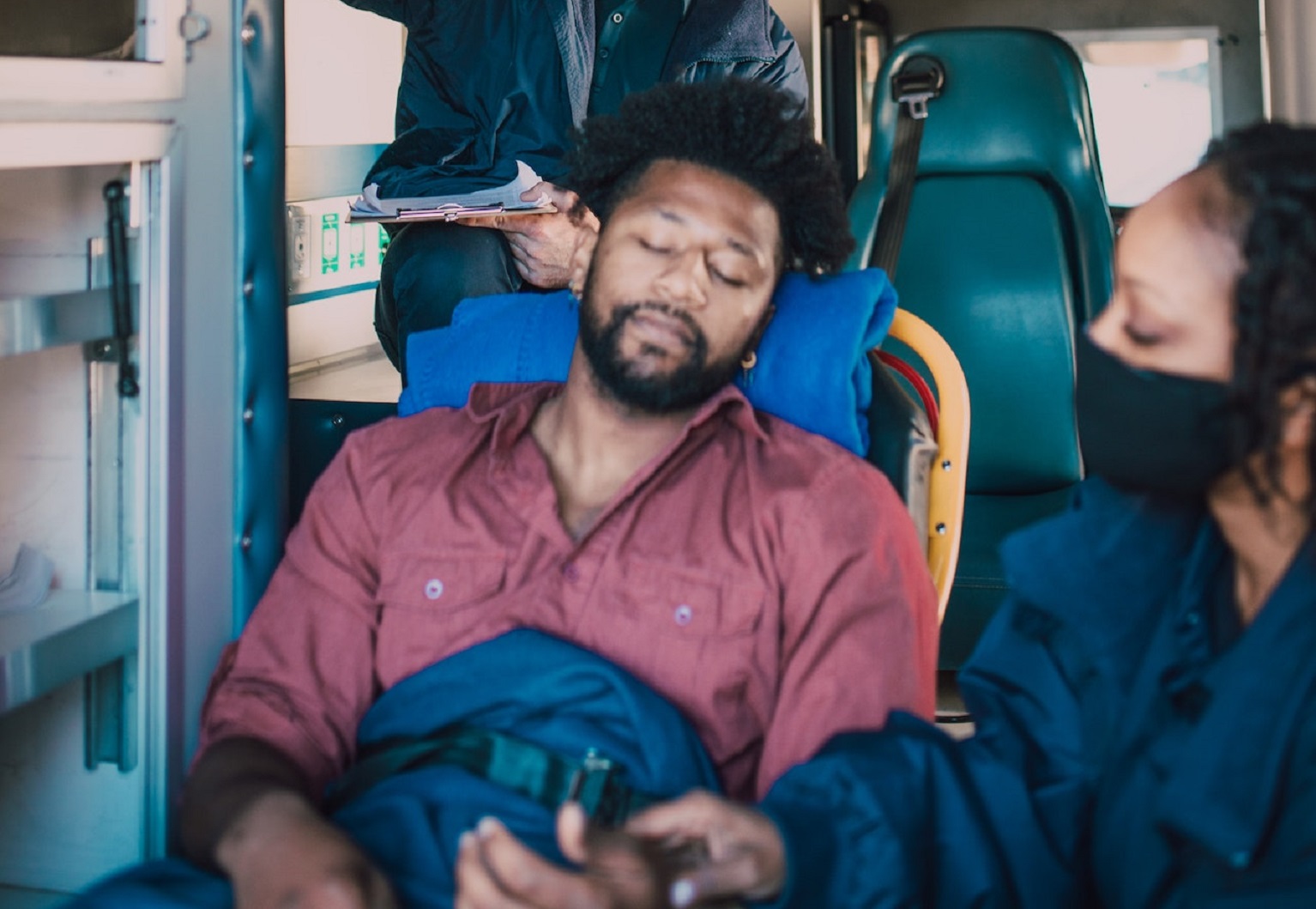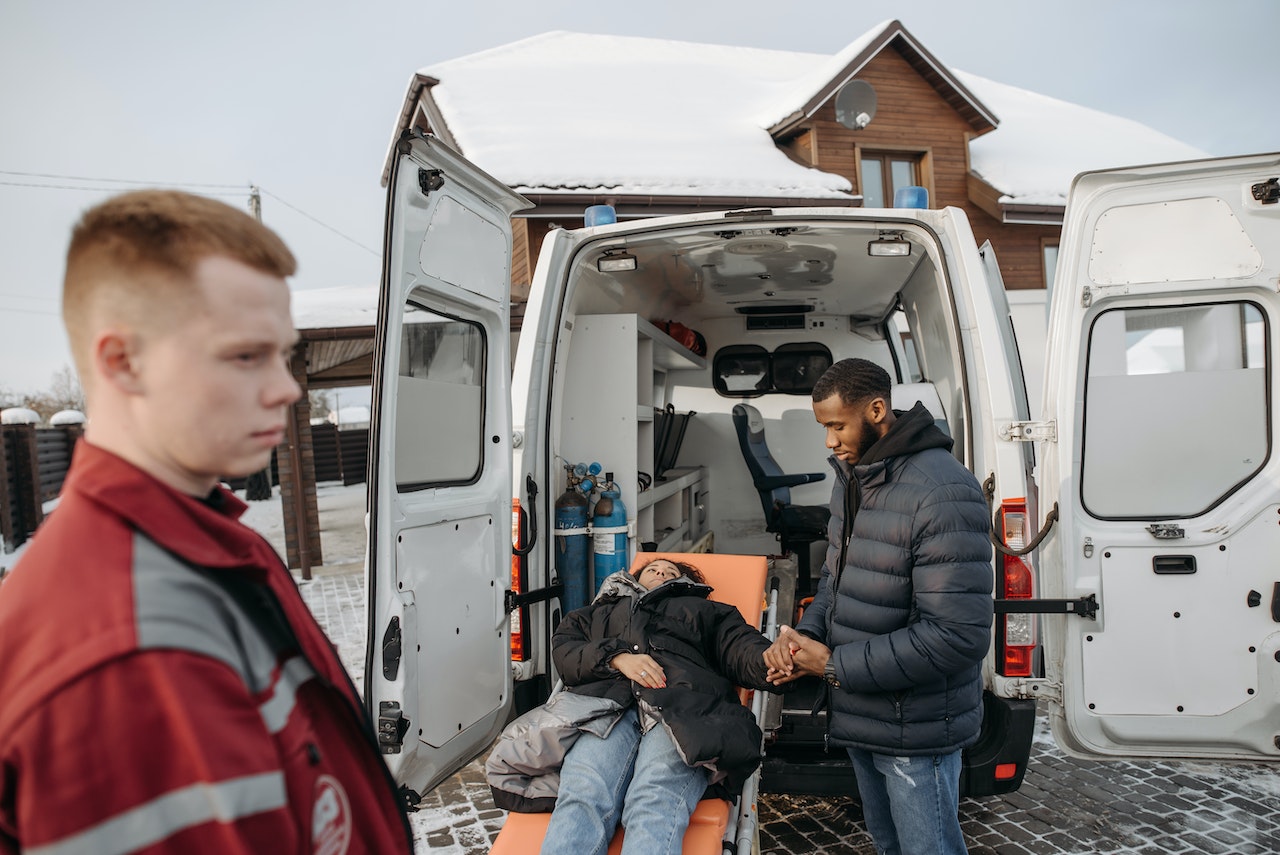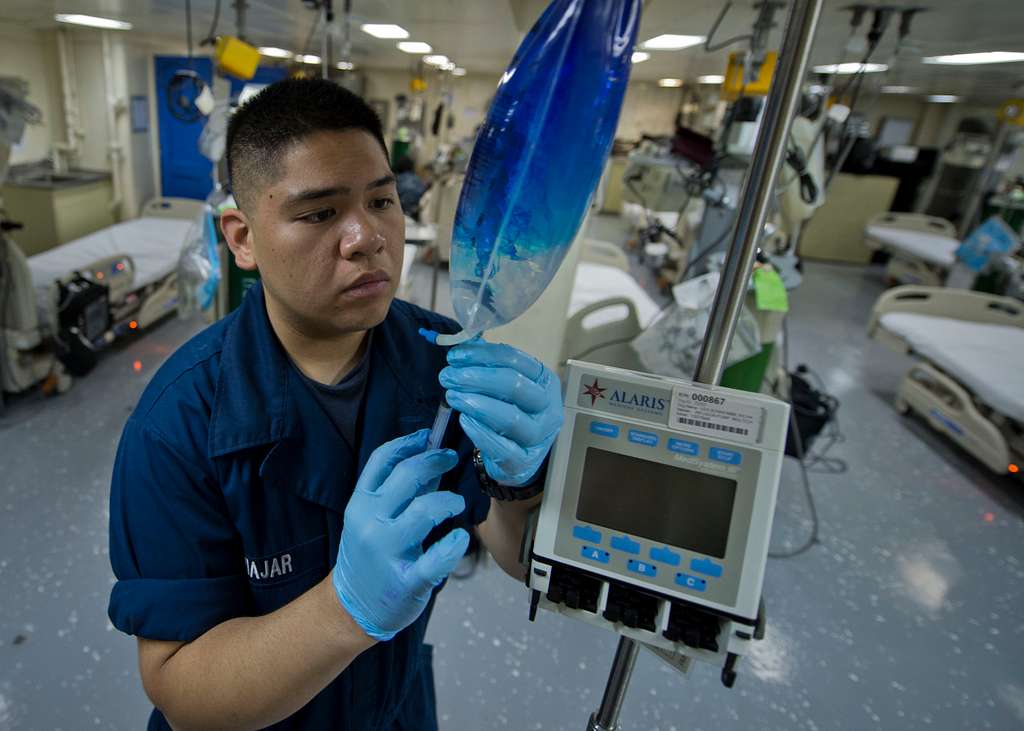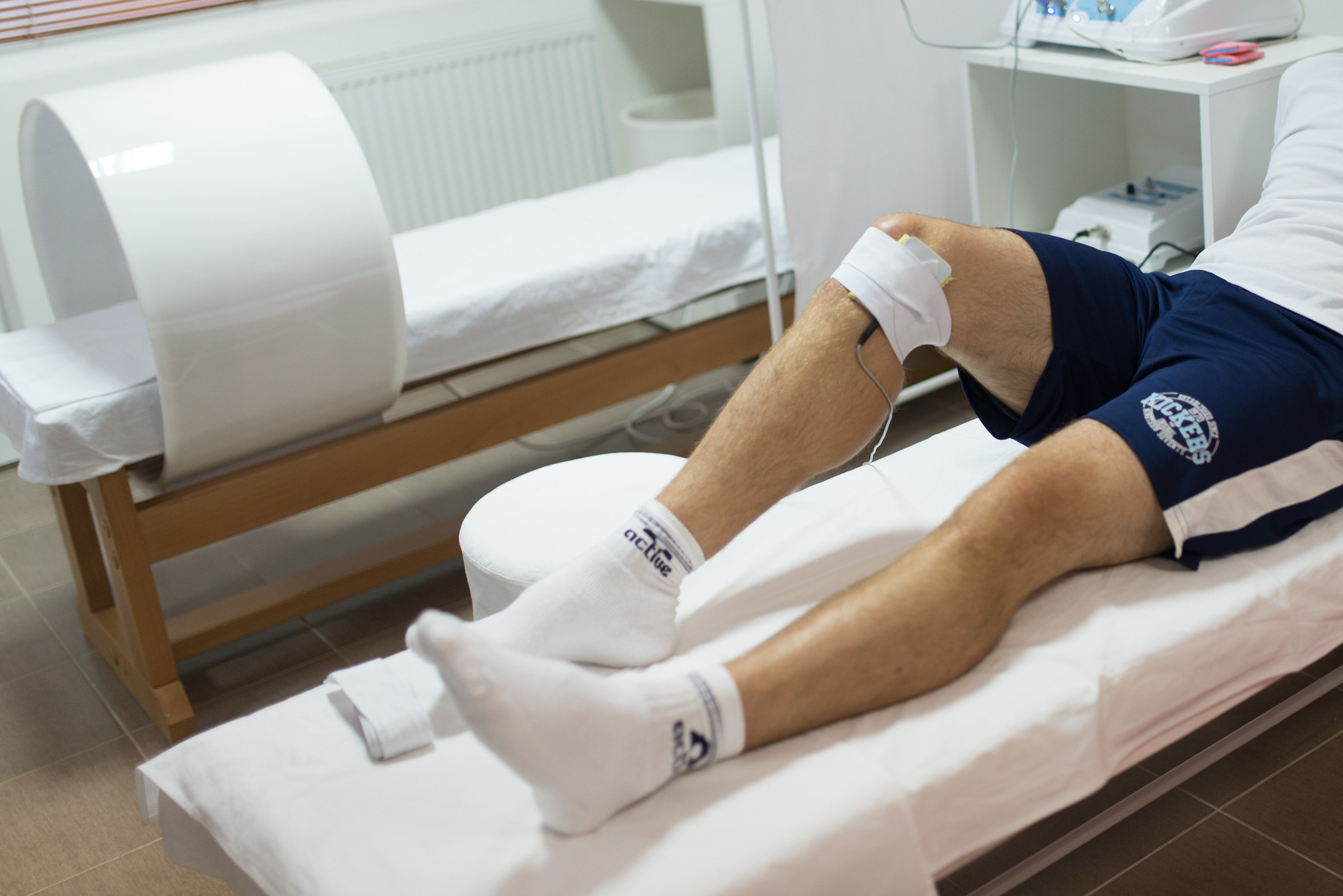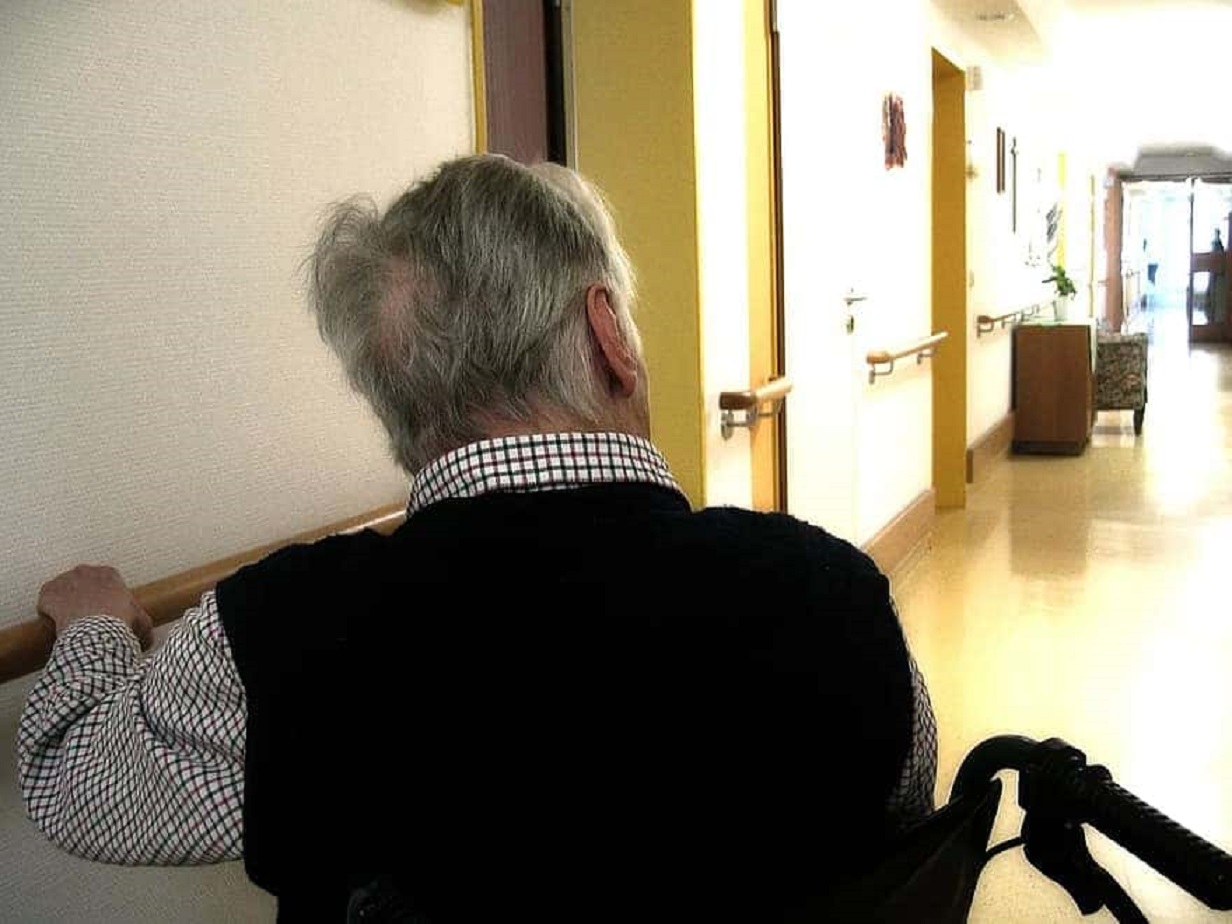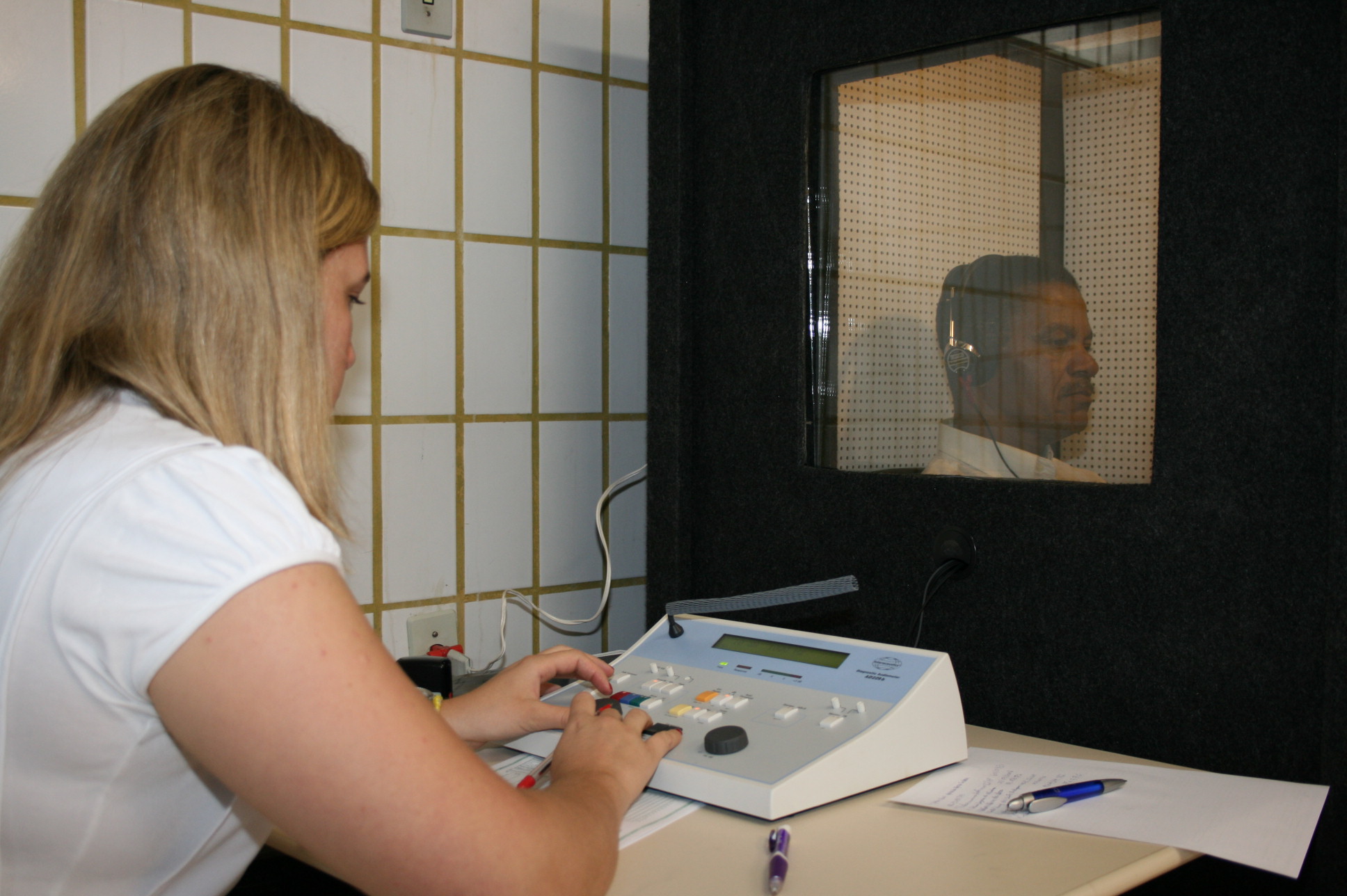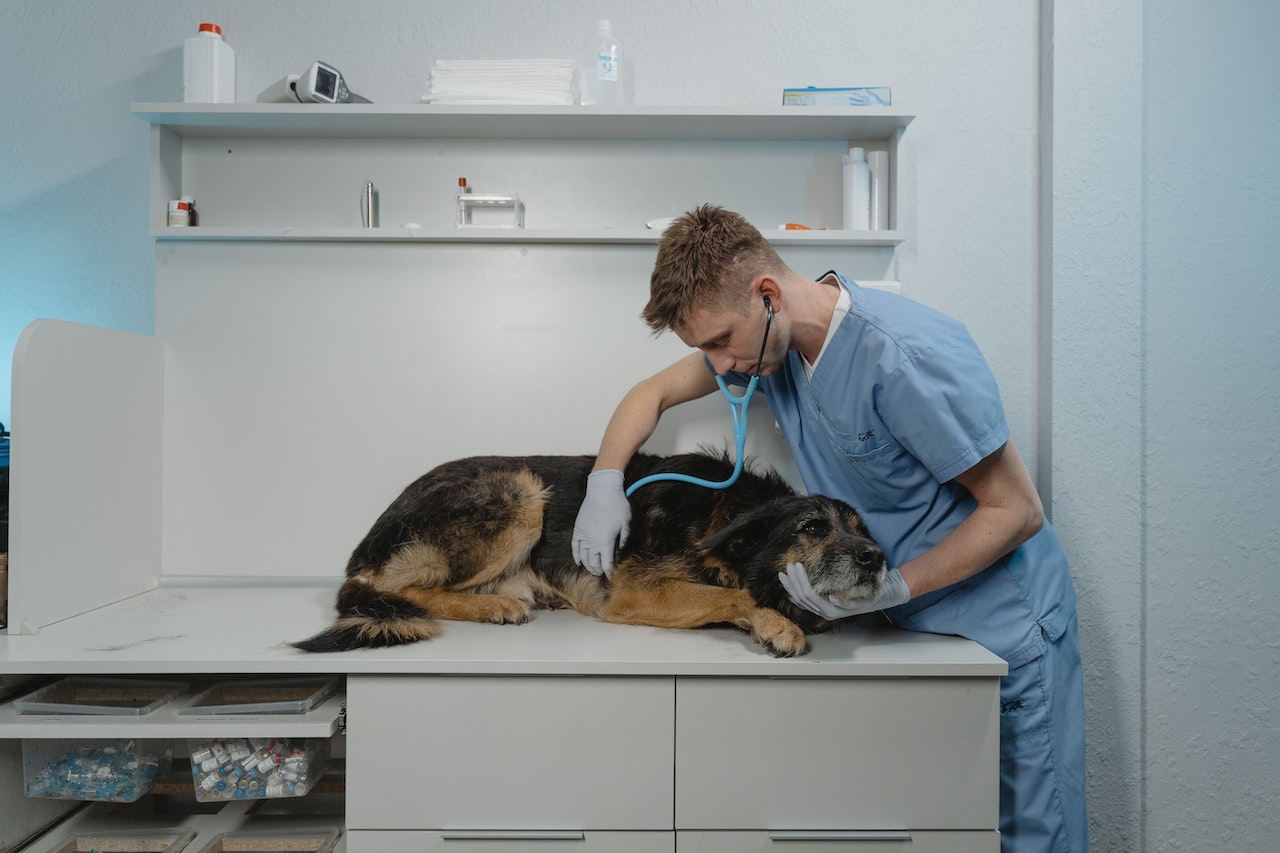Every medical professional has seen their fair share of difficult patients—but some of the most memorable visits involve the moment when it becomes abundantly clear that the person in front of them is totally faking their symptoms. Sometimes it’s just for attention…but sometimes, it’s way more sinister.
1. Silver Linings
A mom visited me once, dead set that her little one had Silver-Russell syndrome. This isn't something you can easily fake as it involves a complex mix of metabolic and congenital complications.
Her child was skinny and shorter than average, and his right arm was slightly longer than his left. These symptoms could indicate Silver-Russell. But when we did genetic testing, we were stumped—the results were negative, which can be the case in 30% of Silver-Russell diagnoses.
There was also another surprising clue—the incidental sign of low blood sugar. As soon as she learned about this from the dozens of articles she had read about the syndrome, she acted irrationally. She returned with her son in a coma. Unlike actual hypoglycemia, her son was not hypoglycemic when he ate regularly in the hospital. Yet, bizarrely, he was admitted again a few weeks later in another induced coma.
The truth was dark—turns out, she'd been starving her child to cause these comas in pursuit of a Silver-Russell diagnosis. Plus, she'd pretend to be wheelchair-bound whenever she was at the hospital. One day, I walked into her room unannounced only to catch her on her feet, darting back to her wheelchair.
I suspect it was all for financial gain. In Canada/Quebec, a child with a genetic disorder fetches government assistance... If I could have, I would have firmly confronted her about her deceptive acts.
 Wikimedia Commons, Flickr: Inauguración de nuevo edificio del Hospital Luis Calvo Mackenna
Wikimedia Commons, Flickr: Inauguración de nuevo edificio del Hospital Luis Calvo Mackenna
2. The Grass Is Always Greener…
When I was around 7 or 8, my big sister discovered she had weak eyesight and needed to wear glasses. My family kept marveling about how crisp and detailed the leaves looked after donning glasses—before that, the trees just seemed like a green smudge. Wanting to be part of the spectacle (pun intended), I joined in and exclaimed: "I can't see any leaves either, it's just a fuzzy green mess for me!"
Fast forward to our visit to the ophthalmologist who happened to be a friend of the family. It was quite clear to me that if I read the letters on the chart correctly, they'd immediately realize my eyesight was perfect. So, I decided to fib a little, blurring my words as the doc kept switching lens options.
Eventually, he landed on one and declares, "I believe this one will do the trick for you". After I effortlessly read out the entire chart, the doc playfully poked a pen through the empty frame—there were no lenses. I was utterly embarrassed and while the doc had a good chuckle, my mom was fuming.
I got a taste of karma that evening for being a dishonest rascal.
3. Monkey Hear, Monkey Do
My spouse works as a firefighter and emergency medical technician. One day, he shared a story about a time they were called in to handle a man who was allegedly having a seizure. Once they arrived, they found a man lying still on his back, who then began pretending to have a seizure. So, they decided to come up with a strategy to unmask his act.
They casually mentioned things like, "Wow, this is really severe. But we would only be seriously concerned if he started doing 'X'". Funnily enough, the man would immediately start exhibiting that exact behavior. This charade continued for some time, until he mysteriously regained consciousness in the ambulance, requesting painkillers.
4. Rock On
My husband works as a urologist. Just recently, the emergency room rang him about a patient said to be in severe distress from kidney stones. The patient had even brought along a stone he claimed to have passed for diagnosis. But something was still off.
My husband goes in, recognizes the patient as someone who frequently visits the hospital for medication, and checks the sample in question. Right away, he figures out that it's just a little rock the guy must have found in the parking lot.
5. Third Time’s The Charm
Once, while interning at a hectic trauma ER, a man strutted into the ambulance area insisting on immediate medical attention. Once in a room, he shared his odd story. Apparently, he'd been in a high-speed car crash the previous night, but didn't visit a hospital to check on his friend, the driver. But he was now losing sensation in his legs and had severe back pain.
His version sounded sketchy, but we followed protocol for severe trauma. We had him positioned on a backboard with a collar on and conducted chest and pelvis X-rays.
The on-site radiologist flagged me down, asking an unusual question that led to clarity—when did our patient get a CT scan? Highlighting the pelvis X-ray, he pointed out that the man's bladder was brightly lit—it was filled with an iodine contrast agent typically injected during CT scans.
With this revelation, we confronted him about his previous hospital visit and CT scan. Suddenly, he delved into an intricate story about suffering from amnesia due to trauma. True to a pattern, he displayed more signs of substance-seeking behavior during his short stay. Eventually, he left against medical advice, not before inquiring about the next closest hospital, likely to repeat the act.
6. Bait And Switch
My wife works as a district nurse. Her day-to-day involves visiting people's homes to provide medical care like changing bandages and administering medication. Her client base is varied, from gang members to people under house arrest. However, out of everyone, she's most wary of the methadone patients, who, according to her, are keen on trying to get just a bit more of what they need.
There was this one patient she had not long ago, who was unusually chatty that day, seemingly keen to have her stay longer. He even insisted on showing her all his minor health concerns, like small bumps or lumps, to ensure they weren't anything serious. Although this didn't make her uncomfortable, it was out of character for him as he is usually pretty reserved and eager for nurses to leave promptly.
When she returned to her car afterwards, she discovered that her back window had been shattered. The only things missing were her medical supplies box, including her sharps bin. It was no mystery what was happening. She ventured back to the patient's house, peered through the front window, and saw him sitting with another man, unsuccessfully trying to pry open her lockbox and sprawling the contents of the sharps bin all over the floor.
She immediately called the police to report the incident. Some of the needles scattered across the floor had been used on an HIV positive patient she had seen earlier that day. She stayed in her car, waiting for the police to arrive—knowing it wasn't a situation she should get involved in directly.
7. Hail Mary Pass
Once, I looked after a patient who was pretending to suffer from Guillain-Barré syndrome, a condition involving worsening paralysis. She was staying in the intensive care unit, and as the new nurse on staff, I was tasked with inserting a catheter into her bladder. Even though she was pretending not to feel anything, I could see the discomfort in her eyes. Eventually, the shocking truth came to light.
Apparently, she'd had a quarrel with her husband and, in a dramatic attempt to stop him from leaving, she pretended to collapse. I don't believe she intended for things to escalate to this point… but then, she didn't know how to reel it back in.
8. The Voices In My Head Told Me To Ask That
Psychology has its fair share of amusing cases, and one sticks in my mind. This particular patient would retreat to her room to utter unrelated sentences or phrases in an exaggerated theatrical tone. Loud enough, in reality, that we could hear her from the central area. Following her outburst, she'd emerge, approach us and question, "How do I know if the voices are real"?
But we were highly skeptical—seemingly, she was perfectly fine when she believed we weren't observing. But, when we deliberately made our presence known near her door, she'd revert to her 'self-talking' charade. Nah, that's not quite how psychosis operates. Though I applaud her effort.
9. Right Place, Wrong Act
Oddly enough, this just happened a week ago. I've been nursing for about 4 years, and this is probably the most bizarre case I've dealt with.
A young adult came to us suggesting she was having seizures. Since we're a neuroscience unit, this isn't unusual for us. On top of that, she mentioned intense stomach pain supposedly related to these seizures.
Despite a series of CT scans and MRIs that came up empty, we hooked her up to a Video EEG machine for 24 hours—that's a live video for tracking brain activity, for those who might not know.
She apparently suffered hundreds of seizures throughout the night, showing all kinds of indications like drooling, uncontrollable muscle spasms, and full body quaking, all while not responding to any communication.
Once she came around from these episodes, she was disoriented and couldn’t recall her own identity, didn't know where she was, or what time it was. However, her neuro check seemed pretty stable otherwise. Strangely, she didn't lose control over her bladder or limb movements during these seizures.
When she wasn't "seizuring", she would cry out for painkillers, yet she strangely rejected every medication we offered. Tylenol? Nope. Percocet? She said it made her feel strange. A Lidoderm patch? Apparently that gave her mouth ulcers. If someone had mentioned stronger painkillers, I'm certain she would have agreed instantly.
After investing 24 hours and thousands of dollars in tests that all suggested nothing was wrong, the doctors essentially had no choice but to discharge her. As they were doing this, she acted out another seizure. The doctor responded by saying he would wait for the seizure to pass.
She immediately stopped. For fear that she might act out, we had security wheel her out, with me following close behind. The team suggested she seek an outpatient psychologist, which made her even angrier. Maybe the seizures seemed real to her, but it was clear she needed a different kind of help.
 Freepik,DCStudio
Freepik,DCStudio

History's most fascinating stories and darkest secrets, delivered to your inbox daily.
10. The Patient Brought His Own Instruction Manual
I'm an EMT. However, it's one incident that particularly stands out, a classic example if you will.
We received an emergency call to a residential area around 2 am (it's always around that time for some reason). This man complained about an immense 10/10 finger pain, all the while cradling his hand in the air protectively. He couldn't trace the pain back to any injury. Rather, he said it just came on unexpectedly and was simply intolerable.
We promptly secured him and got him to the hospital, which was a 25-minute drive away. Throughout the trip, he consistently held his hand in the air. Yet, we chatted about football without him bringing up the pain even once.
Upon reaching the ER, his demeanor transformed within seconds of stepping through the door. He was suddenly writhing in agony, unable to sit still, insisting that the pain was too severe and required to stand up. He began pleading with the nurse for immediate help.
Then, he revealed to the nurse, "This isn't my first rodeo. I had the same problem two weeks ago at another hospital. They couldn't figure it out either. They gave me morphine, which was a dud, but Dilaudid did the trick. So, how about we skip to the chase and start with Dilaudid tonight?" He then returned to his painful moaning.
The nurse and I exchanged bewildered looks. We assisted him onto a bed, and then I embarked on the 35-minute trip back to the station. Personally, I highly doubt any pain meds were administered to him that night. The whole event seemed to be an unnecessary drain on everyone's resources.
11. Dine & Dash
A guy dialed 9-1-1 from a nearby restaurant. He reported that he was battling a migraine that was so severe, he was having difficulty seeing, even though he was just two blocks away from a hospital.
As a previous migraine sufferer, I felt for him. En route to the scene, I was already thinking about how I could alleviate his discomfort during his wait at the emergency department. However, my disbelief kicked in when we arrived.
He was standing outside, completely exposed to the bright sun, waving at us. He graciously thanked us for coming to his aid, then hopped into the well-lit ambulance, chattering away, making improper jokes and laughing the entire time. He maintained that he was in extreme pain from a migraine, but only Percocet seemed to lessen his agony. He got these headaches often, and lo and behold, he was out of his prescribed medication, and his usual doctor was unavailable.
The ludicrous nature of the situation escalated when the restaurant's chef approached to ask the guy for his details. Apparently, the patron couldn't settle his tab "because of the pain.” He conveniently didn't have any ID to leave with the restaurant, only his debit card. He vowed to return once he was well enough to punch in his PIN, but claimed he couldn't manage it at the present moment. The chef was absolutely sure the guy was pulling a fast one, but was powerless to respond.
As a person who has had debilitating, nausea-inducing migraines in the past that affected my vision, this guy did a poor job convincing anyone he was genuinely in discomfort. I honestly would have preferred if he'd said, "I've eaten a meal I can't pay for, and I'm hooked on painkillers. Can you take me to the ER, please?" His honesty would have led to better treatment from all parties.
12. A Bit Of A Stretch
I work as an EMT, and once, I was dispatched to a bar for an unconscious person who was tipsy. We managed to get her to the ambulance, and all of a sudden, she yells, "I'M HAVING A SEIZURE", flailing her arms all over the place. I let out a scoff—then I put her in her place: "Usually, people about to have a seizure don't declare it beforehand".
She replies, "Well, you're being quite prejudiced, I was just preparing....in case I was going to have a seizure".
Well, stretching is important, I suppose.
13. A Running Gag
So, I'm not a medical professional, but I work as an attorney who specializes in disability cases. I've encountered some pretty blatant fraud attempts. One memorable incident happened at a peculiar hearing office which is essentially a single courtroom attached to one of our secondary offices.
Judges frequently travel from our main office to conduct hearings here. However, the entrance is located on the building's side, which often confuses people who end up waiting at the building's front, despite my instructions.
One of my clients had this exact issue. She was applying for disability because she stated she couldn't even take a few steps without experiencing severe pain. She typically used a cane or a walker for mobility. The strange thing is none of this was mentioned in her records. Her initial explanation was that she couldn't afford a doctor's visit, so I trusted her.
As her hearing was about to begin, she hadn't shown up yet, which made me slightly worried. Without further delay, I went outside to call her, but her phone was turned off. Instinctively, I thought she might have entered through the front door. Whilst on my way there, I was met with an unusual sight.
I spotted her sprinting towards the side of the building, cane in hand. She didn't even notice me standing there in the parking lot. A few minutes later, as we prepared for the hearing, she was back to barely being able to walk.
Of course, there are many cases where individuals can only manage short activities but struggle with prolonged walking or standing needed for lighter jobs. Still, this clearly wasn't such a case.
It was a blatant attempt to exaggerate her condition for the hearing. Thankfully, her other mental health issues were well documented and genuine, but it was quite amusing to witness this seemingly miraculous recovery right outside the building.
14. Eau De Overreaction
We had a coworker who was continuously worried about her health, claiming to be allergic to almost everything. It became such an inconvenience that we decided to relocate her desk to an isolated spot to alleviate the constant complaints.
One day, a woman strolled by wearing a powerful perfume, and immediately our health-conscious coworker had a response.
Unsurprisingly, emergency medical services were summoned as she dramatically lay on the floor, eyes rolled back in her head. It would have been frightening if we weren't aware of her eccentric tendencies.
Upon arrival, EMS strapped an oxygen meter to her finger. Despite her gasping speech, the meter displayed an oxygen saturation near 97%. The paramedic informed her, "There's no medical reason for your breathing difficulties right now.”
The team stuck around for a few more minutes before departing.
15. Nurse Karen
She used to be a nurse, but was now on disability. She would try to fake seizures, which really isn't an easy thing to fake. She'd hold her breath, shake her body, and roll around the bed to make it look real. Her oxygen level would drop into the 70s because she was holding her breath—and maybe our sensor couldn't accurately measure it while she was shaking. This is when we decided to put our foot down.
We warned her that if she couldn't safeguard her airway, we'd have to intubate. Strangely enough, she'd stop her "seizure" right there and then. And unlike most patients, she never showed any confusion after the event and was able to recall the whole episode, including all conversations. What was even worse?
She threatened to talk to my boss because I refused to administer Ativan during one of her "seizures."
16. Problem Solved
I was dealing with a male patient, around 30 years old, who had been unconscious and non-responsive for a period of six hours. This gentleman was intensely committed to his performance. At first, I thought it was a stroke—but I dug a little deeper. With his blood pressure, ECG, reflexes, and pupils all appearing normal, I decided to test his sensitivity to pain.
As I urged him to tell me his name, he slowly started to open his eyes and mumble. But, once his Achilles' tendon was compressed, he suddenly sat up straight, confidently stated his name, and announced he was completely healed.
17. Starting A Trend
During my residency, I cared for a patient who had a blood clotting disorder but was also hooked on intravenous pain medications. He devised a pattern which involved being admitted to our unit for a thorough checkup for a possible lung clot and getting a sustained dose of IV painkillers for his so-called "chest pain."
His frequent appearances were really challenging to manage. We couldn't dismiss his admission because he indeed posed a substantial risk given his mismanagement of his blood thinner medication, and his symptoms always granted him a couple days with us. His process meant he'd received over 30 high-resolution chest CT scans throughout his life, which obviously wasn't a healthy scenario.
I had this unique question that I used to identify patients who were potentially pretending. I'd ask people who kept complaining about every severe symptom they could imagine, "Do you feel pain behind your eyes when you use the toilet?" I found it quite effective.
At that point, I was quite frustrated—this patient was a real headache to deal with. Not to mention, it bothered me that he was risking a lung tumor by continuously undergoing these scans, only to secure one day's worth of IV painkillers and Benadryl.
When it came to him, I began to ask my unique question like it held significant importance. Soon, he started saying "yes," at which point I'd act like it was an extremely serious condition that required evaluation, especially when I had no other way to prevent his admission.
One day, he walked into the ER complaining of "pain behind my eyes when I pee," and I considered it one of my most successful outcomes in my residency. I smiled hearing a fellow resident talk about this peculiar patient who demanded admission due to uncommon eye pain related to urination. It was the highlight of my day.
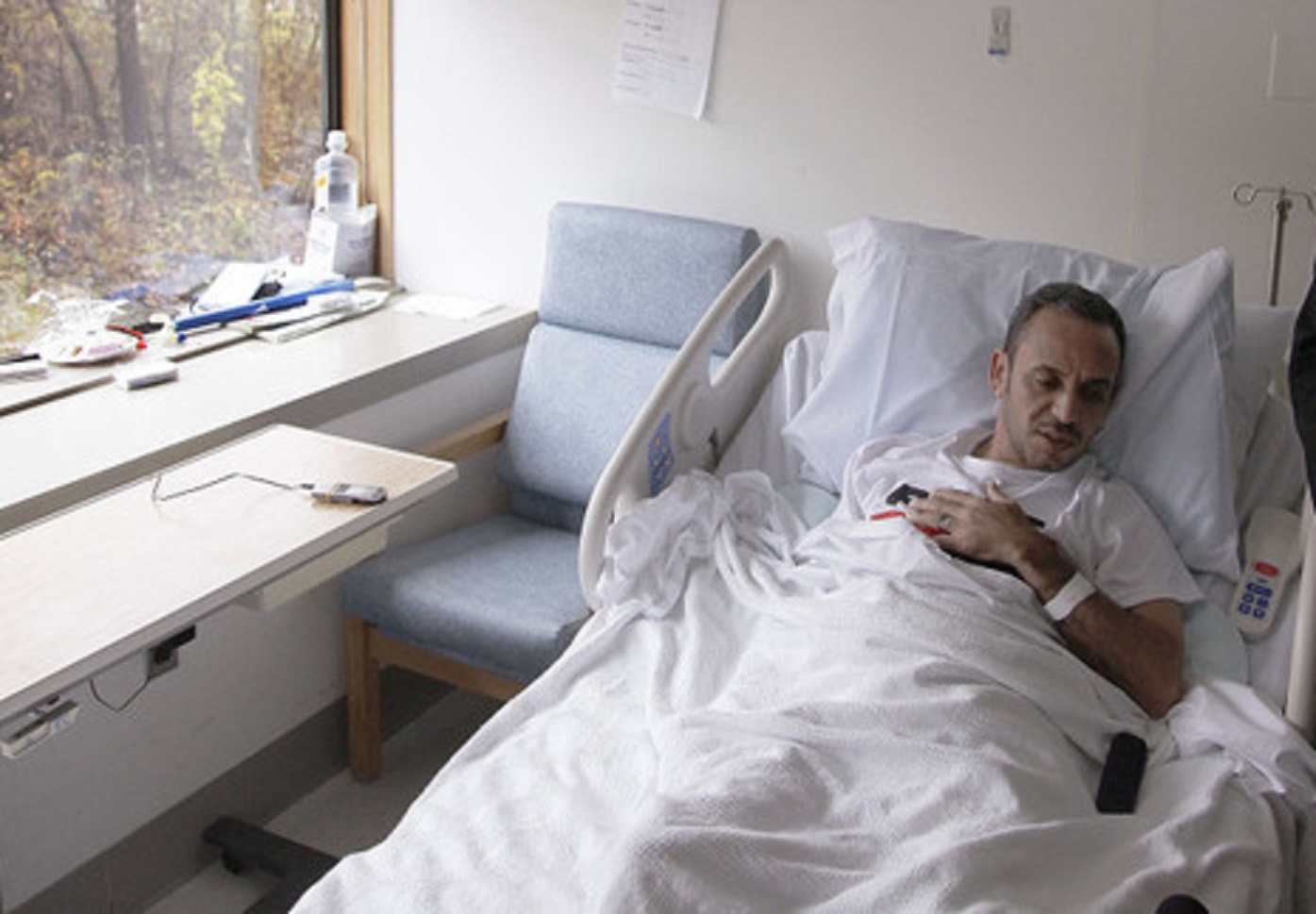 Flickr, U.S. Army Southern European Task Force, Africa
Flickr, U.S. Army Southern European Task Force, Africa
18. Playing Hooky
I was working with a 17-year-old female patient who came with symptoms of shortness of breath and seizures. Her body signs were all in the clear zone when she checked in, and although she was awake, she wasn't eating. Her parents were frantically worried, and every so often, she would have an episode where she'd sway back and forth.
Interestingly, she let it slip out to one of the nurses that she was pretending to be sick because she didn't want to attend school during that week. Because she avoided eating, a doctor's note was made to have a feeding tube inserted in her nose (which she promptly yanked out after it was placed).
As her parents wouldn't agree to have her moved to psychiatry or got discharged, we just ended up giving her placebo pills. She finally left after a 4-day stay.
19. Revenge Is A Dish Best Served Pettily
I once encountered a 21-year-old male patient who had been unable to speak for a couple of hours and was experiencing difficulty breathing. His lungs were fine, yet we provided him oxygen temporarily. When we removed the oxygen, his father urgently motioned for me, sharing that his son wouldn't put his tongue back in his mouth after the oxygen treatment.
When I checked on the patient, he was just lying there, sticking out his tongue like a little kid. I advised them to simply push it back in. A few hours later, the father reported the boy was having seizures. However, as I stealthily observed him, he seemed perfectly okay.
Only when I engaged with his mom asking about his condition, he began theatrically "convulsing". Imagine, an odd rendition of a worm dance, but lying down. However, the real joke was yet to be revealed.
Eventually, we figured out the funny truth. The patient was actually upset because his father confiscated his mobile phone. As a result, this little act was his peculiar strategy for "revenge" on his dad.
 Freepik,tonodiaz
Freepik,tonodiaz
20. Breaking The Fourth Wall
My disability law firm had to let go of one of our clients, a woman who visited a clinic with her husband and son. Frustrated by what she perceived as insufficient examination, she had an outburst in the corridor just outside the doctor's room, experiencing some kind of "episode”.
The entire sequence was captured on film by her son. The whole ordeal was...questionable. She was behaving as if she were having mysterious blackouts or something to that effect.
While she was faking symptoms such as fainting, shortness of breath, dizziness, and weakness, she was purposefully hyperventilating. In addition, she was dramatically calling for an ambulance and sneakily glancing towards the camera—almost as if she was ensuring her son was documenting it all.
Unable to handle the situation, the clinic staff ended up calling an ambulance just to have her removed. Before its arrival, she "fainted". When paramedics arrived, they checked her responsiveness by rubbing her sternum—she reacted physically but intentionally kept her eyes shut. They even attempted to drop her hand over her face, but she smartly let it fall onto her shoulder.
We viewed that video multiple times, finding it hard to believe someone would resort to such deceit and noting the blatant signs that she was pretending. We decided to terminate her as a client, but left the door open for her return if she sought mental health treatment for six months and showed no signs of improvement. Sadly, we never saw her again.
21. Shakin’ All Over
My sister-in-law once had a "seizure". Following a minor car mishap, a doctor suggested she might have had a slight seizure during the incident. My brother was worried about leaving her alone with their child, so she stayed at my parents' house while he was at work.
Then, she began having these "seizures" regularly. But here's the twist: it only happened when there were people around. I only saw it once, but it was odd. It was the day before Thanksgiving, with the entire family gathered at my parents' house—me, my other siblings and our partners.
As we were chatting, she suddenly began convulsing, slid off the couch to lie on the floor, squirmed a bit more and then pretended to faint. My father dialed 911 and when paramedics arrived she was still "unconscious". They started probing her with questions like "Can you hear me?" and she would respond with nods.
I recall the paramedic stating, "It's strange that she is responding". Not long after, during another visit to my parents' house, she had another "seizure" while one of my dad's friends was present and rolled onto the floor. My father's response was truly memorable.
Having had his fill of the drama, he just stepped outside with his friend. Upon returning, she was lounging on the couch as if nothing had happened and didn't bring it up either.
22. DIY Symptoms
One morning, my brother approached my mom, complaining of feeling ill and asked her to check his temperature by touching his forehead—that's her traditional method to judge if we have a fever and can stay home from school. However, mom was firm that day and instructed him to prepare for school. He was cluelessly sporting grate marks on his forehead because he'd been rubbing it against the heater.
23. Caught Red-Handed
My colleague, who's an administrator with a background in Emergency Department (ED) nursing, was needed in the ED one night last year. A patient was there, vehemently insisting on an admission due to her intense headaches and nosebleeds but outrightly refusing any form of examination.
It became apparent that she wanted pain medication, as she declined to even lay on the provided bed. My coworker stepped outside the patient's glass enclosure to discuss the matter with the charge nurse, only a short distance away.
Mid-conversation, the patient's behavior caused them to pause. She turned, adopting a doubled-over posture. The sight that followed can only be described as unforgettable and quite disturbing.
The patient, with blood smeared across her nose and her fingers red from blood, had been reaching into her underwear and wiping menstrual blood on her face. It was a shocking attempt to fabricate the seriousness of her nosebleed.
24. Placebo Effect
A teenager was brought in exhibiting unexplained seizure-like symptoms. Her anxious mother and boyfriend never left her side. How she ended up here in admission is still a puzzle. Out of the blue, she seemed to have a seizure and her family quickly signaled for a rapid response; think of it as an emergency but it's not exactly a 'code blue'.
In response to the alert, the backup team and the on-call doctor, who wasn't exactly a ray of sunshine, showed up. He definitely had something up his sleeve. While rushing to the situation, the doctor requests, "Hand over a saline flush, please".
Upon reaching the room, he reassures the patient, "Don't worry, Jane. I'm about to give you some medication that should help ease things. It's going to take effect very soon". Remarkably, that saline solution stopped her seizure almost instantly...
25. Conjugal Visit
Joining the conversation as a fellow paramedic! Picture this: I once had to respond to a call for a "cheap pay-by-the-hour motel" around 3:30pm because of an alleged seizure. When we arrived, a 25-year-old man was calmly sitting on the bed.
His girlfriend reported that he had been shaking all over, but the shaking had stopped just before we arrived. Although he seemed completely aware and responsive (which is odd because generally, folks who've had a seizure take a bit to fully come around), the couple mentioned a non-specific history of seizures with no confirmed diagnosis or medications.
Interestingly, the guy even handed over his driver's license for identification—kind of unusual if you think about it, because typically you'd lose your driving privileges if you're prone to seizures. Once we finally got him onboard the ambulance, the girlfriend wanted to tag along. I naturally said yes, and then the plot thickened.
It turns out, she was on a day release from the exact same hospital we were heading towards and needed to be back by 4pm. There's only one department there that authorizes such passes—the psychiatry unit!
 Freepik,benzoix
Freepik,benzoix
26. Surprise!
Uncle to my son had pretty severe mobility issues, he was virtually bedridden. To even use the bathroom, he had to take the help of a walker, a slow and painful process that took him around 10 minutes just to get to the toilet in the rear end of the house. For a good number of years, our family served him wholeheartedly.
On one such family visit, my infant son drifted off to sleep in the living room. I decided against disturbing his sleep and stayed back immersed in my book, while the others headed out. The house was engulfed in an eerie silence.
Suddenly, I heard Uncle getting out of bed. To my utter surprise, he walked briskly past me without any hint of struggle, and certainly without the walker. When I greeted him with a 'Hi', he jumped, startled out of his wits, his expression was simply priceless!
27. Get Out Of Jail Free Card
We once had a unique patient. The gentleman had undoubtedly performed a terrible act—there's clear video proof. After attempting to evade the police, he crashed his car, resulting in a broken leg. I've encountered people who behave like toddlers before, but this guy was the epitome of that.
I'm guessing he believed his inability to walk would save him from imprisonment. Despite being a perfectly fit 20-year-old, he adamantly refused to even try walking with crutches, a cane, a walker, or any other aid. I wanted to give him a piece of my mind, but held back because a mentor and four police officers were there at the time.
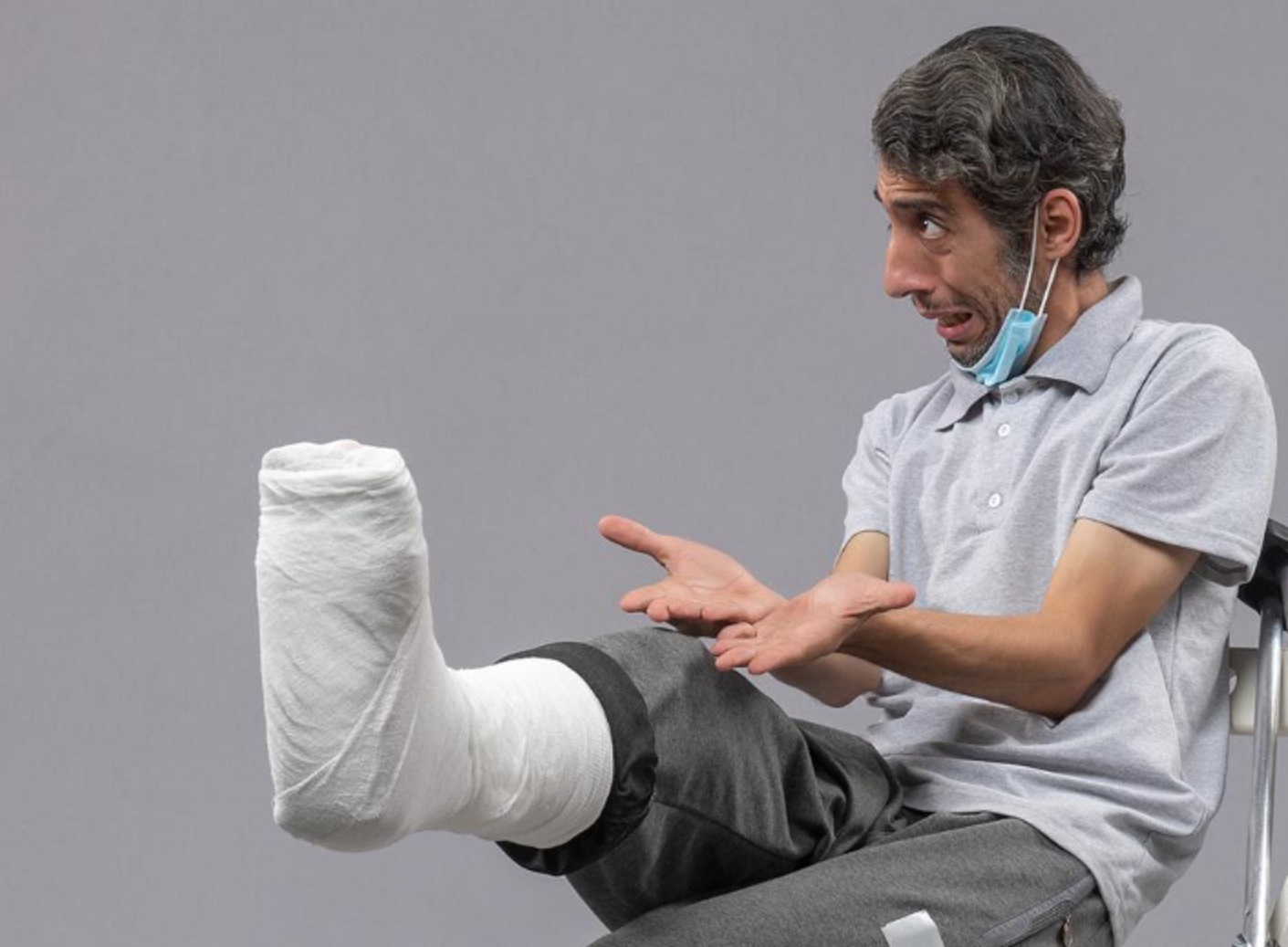 Freepik, KamranAydinov
Freepik, KamranAydinov
28. No Such Thing As A Free Meal
We were summoned to a local Waffle House due to a reported seizure. Once there, we found a man lying still on the ground but still breathing. We initiated a conversation with the server to understand what had transpired.
During this dialogue, we caught the man surreptitiously peeking at us through a nearly-closed eye—only to promptly shut it when he noticed our attention. This odd routine repeated itself several times. Shortly after, the police arrived to assess the situation—and the truth came out real fast.
One officer turned to the server and enquired, "Did this gentleman (referring to the patient) dine here?" "Yes, he did", she confirmed. "How much does he owe?" "Fourteen dollars," was her reply. On hearing this, the policemen flipped the man over to retrieve his wallet, inside it was a $20 bill.
One officer pulled out the cash as payment to the server, telling her, "Keep the change". You could practically feel the resentment emanating from the man upon realizing he wouldn't escape his tab. Turned out, he had faked the seizure all the way to the hospital.
 Freepik, photoroyalty
Freepik, photoroyalty
29. The Carrot And The Stick
My mom was the resident nurse at my high school. She's been a nurse all my life and has shared some unforgettable tales with me. I was fortunate to be there once when a student tried to fake an illness to skip class.
This guy, let's call him Derrick, was a pain in the neck. He was unsociable and pretty destructive. He wasn't exactly my favorite person to be around. But there I was, when I heard Derrick enter the room, gearing up for his attention-seeking performance.
So, as usual, my mom proceeds with the routine checks, temperature, blood pressure, and so forth. Unable to take it anymore, Derrick bursts out with, "Mrs. S, there's truly something wrong with me this time, and I promise I'm not faking." His defensive wall was already a mile high.
She asked, "What's the matter Derrick?"
With a dramatic tone, he begins his story, "So, this morning, I started feeling awful, and I went to the bathroom to throw up. After I finished, I noticed the unexpected... there were more than a dozen whole baby carrots... and guess what... I DON'T EVEN EAT CARROTS!" He was virtually yelling at this point.
After about a soundless 10 seconds, mom, struggling to keep a straight face, came up with a witty retort.
Her response, muffling her laughter was, "Well Derrick, it seems like your body is generating carrots at a shocking rate. Isn't it peculiar though, how it only happens around gym class time? Here's a Gatorade and a hall pass. Get back to class and I'll probably see you tomorrow."
With that, a flabbergasted Derrick left. We couldn't help but have a good laugh afterwards.
"And I don't even eat carrots"... well, that line became our favorite family joke.
 Freepik,freepik
Freepik,freepik
30. When You Gotta Go, You Gotta Go…
So, there was this man who was pretending to have signs of a stroke. He told us that his leg wasn't working, and even when the doctors checked it out, he stuck to his story. However, not long after, maybe just five to ten minutes, I peeked into his room and guess what? Yep, he was on his way to the restroom, walking quite normally too.
But as soon as he spotted me, he quickly put on a show. He began to limp, exaggerating how difficult it was to walk. After a while, though, I think they sent him home.
31. Plan Foiled
We were summoned to the women's restroom at Wal-Mart due to a fall. Upon entering, we met an anxious manager. Inside the bathroom, a white woman lay on her back. Judging by the eye, she was probably around 350 lbs. Two of her friends were there with her.
When asked what happened, she said she slipped on a puddle and hurt her back. But inspecting the bathroom, I didn't see any water. Questioning the manager and her friends revealed the same: no visible water.
I kindly informed the lady there was no water on the floor. Her response was that she was lying on top of it.
To help her, we needed to roll her to a side to slide a backboard under her. After explaining this, I checked her back for injuries and felt for any dampness. Still, nothing was wet. The manager and her friends also verified this.
With her safely on the board, we carried her to a stretcher. It was then I knew what had to be said.
I let her know I'd be filling paperwork regarding this incident, including her claim about the wet floor, which had proven untrue. I explained that in case of a lawsuit, Wal-Mart would have access to my report and could ask me to testify. If they did, I'd present her claim and my findings, along with the testimonies of the manager and her friends.
I then asked the lady to choose: continue this falsity and go to the hospital, or get up from the stretcher and move on.
She opted to leave.
32. Them’s Fighting Words
You know, my pops has a job at the Accident and Emergency department and often sees folks drop in just to get noticed.
Once, this guy showed up pretending to be knocked out cold, the same fellow who'd tried this trick just a week prior. But the rules say these folks can't be turned away. Recognizing the guy, my dad kind of goes, "Hey, isn't this the rascal who was here just last week?" That's when the man's demeanor totally switched.
Suddenly, the guy springs awake like magic, starts throwing out slurs left and right, and has to be restrained. Quite the character, right? But hey, it sure does make for some interesting dinner-table stories!
33. When The Let Ankle Doesn’t Know What The Right Ankle Is Doing
As a nursing student, I experienced something quite peculiar while working out at the gym. The man next to me took a tumble off the elliptical machine and, oddly enough, managed to get his foot uncomfortably wedged between the foot pedals. Surprisingly, the normally adept gym trainers, who typically have solid first aid skills, seemed in over their heads. An excessive reaction was brewing, with discussions about calling an ambulance. That's when I offered to step in.
"Ouch, my ankle!" He was sprawled out on the floor clutching his leg. I went over and bent down next to him.
"Hey, man," I said in greeting, coming up to him from behind. He was so startled he stopped groaning momentarily. I asked him, "On a scale from 1 to 10, how bad does it hurt?"
"Um...8," he managed to say. I examined his ankle and found a minor scratch about the size of a penny, with very little blood. His ankle wasn't swollen, and the area around the scratch was only slightly red. I asked him to point, flex, and rotate his foot, all of which he did without any apparent discomfort—not even a flinch.
I concluded that he might've been exaggerating his pain given the embarrassment of falling off gym equipment in front of everyone. I got him an ice pack and assured him that he was okay, advising the trainers that there was no need for an ambulance after all. But, things didn't stop there.
His sister came to collect him in her car, and amusingly, he hobbled out favoring the wrong leg.
34. The Minimizer
I once treated a man in his early 70s, a longtime smoker, who was having trouble breathing, coughing, and even spitting up a bit of blood-tinged mucus—a really concerning sign.
He also mentioned some back pain, which started a month earlier when he was helping his son move. He didn't seem overly bothered by it, rating it at 2 out of 10.
Apart from some mild anxiety and depression, he had a clean bill of health: great blood pressure, no cholesterol or diabetes problems.
When we examined him, reduced breath sounds were notable, especially on his left lower side. A touch on his lower back made him wince and he rated the pain as 3 out of 10—a slight increase.
His vitals showed high blood pressure at 180/85—likely due to the severe pain—and an elevated heart rate of around 120, again likely pain-induced.
The tests and scans brought concerning news. He had three fractured vertebrae, likely from cancer, and a malignant fluid build-up in his lung lining, indicative of cancer. There were also several masses in his left lung. Turns out, he had advanced lung cancer that had spread to his back, causing the fractures. Despite this, he downplayed his pain as only minor.
I can only guess that his tolerance was exceptionally high, or perhaps he was intentionally downplaying his condition. We tend to refer to these patients as "minimizers."
This story isn't what you might expect.
He underwent surgery and was ready to discharge himself the very next day. He claimed he had paperwork and bills to settle. He refused most of the prescribed painkillers, taking them only at night to aid sleep.
I genuinely hope he's doing well. He was a truly nice gentleman.
 Freepik,DCStudio
Freepik,DCStudio
35. Defending The Fort
I once picked up my mother-in-law, who is a family doctor, from her clinic. I was waiting alone in the lobby when the receptionist stepped out for a quick coffee break.
Suddenly, an unwell-looking man appeared, wheeling himself in a wheelchair. He pulled up next to me, coughing and looking quite rundown.
Just before the receptionist returned, the last patient of the day left the clinic.
A few moments later, my mother-in-law emerged and saw this man. She immediately asked "Mr. So-and-so, please leave." He responded with a jumbled plea about being in so much pain and not being able to walk, among other things.
She warned him that if he didn't leave, she would call the police. His reaction? He sprang from his wheelchair ("couldn't walk," remember?) and charged towards her. He wasn't extremely fast, but he seemed dangerously intent on causing harm.
I immediately sprung into action, managing to pin him against a wall before he reached my mother-in-law. He was unexpectedly strong—completely shocking.
In response, my mother-in-law promptly secured herself in the receptionist's office behind the glass. Apparently, confrontations like these weren't unheard of, which is pretty unnerving. She locked the door, I let the guy go, and he seemed more focused on my mother-in-law than me. Although I wonder in hindsight if I should've kept hold of him in case he had a weapon, I felt like I could handle the situation.
Ignoring me, he started pounding on the glass and shouting at her. It was like I was invisible!
As a side note, when the receptionist returned and saw the man, she was so surprised she spilled her coffee and took off running. It was a rare comical moment in an otherwise intense situation.
About five minutes later, a couple of police officers finally arrived. The man, oddly enough, calmed down then. They arrested him, and after we completed our statements with the police, I was finally able to drive my mother-in-law home.
Later, she revealed that the man was likely seeking prescription painkillers, a common issue she encounters. Despite the drama, I still can't wrap my mind around how the man who said he "couldn't walk" could get up and charge like that.
36. Get Your Story Straight
Back when I was training to be a nurse, I encountered a woman who was frequently hospitalized due to genuine neurological disorders. On top of this, she had been diagnosed with borderline personality disorder and was known to be quite manipulative.
She had visited the hospital so many times and had undergone so many neuro tests that she could convincingly imitate the symptoms of a serious condition like a stroke.
The issue arose during one of her visits that I observed. I couldn't believe her outrageous antics—she'd pretend to have weakness or paralysis on one side of her body—moving only half her face, talking oddly due to using just one side of her mouth (since she claimed the other half was 'paralyzed'), and so on.
But sometimes, she'd slip up and move something on the side she had alleged was paralyzed, like a finger for instance.
37. Memory Like An Elephant
Once upon a time, there was a patient who came to me with serious stomach pain and signs of cholecystitis. Usually, a CT scan would be our go-to, but due to his medical and surgical history, and allergies, our options were limited. Surprisingly, he turned down the few tests we suggested.
To make things more complicated, he was from another city and didn't have a local doctor whose records we could access. His blood work and vital signs came back normal, which raised my suspicion. Nevertheless, we admitted him to the ICU while figuring out our next step.
During his admission process, he claimed he was aware it was his gall bladder causing the problems, as he had experienced issues before. He kept apologizing for being overly dramatic, but insisted he had never known such severe pain. On the resident's order, he received a mix of strong painkillers until the specialist could visit.
Eventually, the doctor walked in. He had a certain spark in his eye that I noticed right away. After I briefed him, the doctor proceeded with his examination. Our patient squirmed in bed as the doctor questioned him and examined his abdomen.
The doctor concluded it was most likely a severe gallstone and cholecystitis problem, which the patient agreed with and asked for more pain relief. With a nod, the doctor agreed, saying, "Yes, I would recommend pain relief for gall bladder troubles like yours.”
The patient paused his squirming and broke into a smile. And then, the doctor dropped his knowledge bomb: "However, you don't have a gall bladder. I remember, I removed it myself a few years ago at X hospital. Good to see you again though".
Our patient's smile faded into the most displeased expression I've ever seen. He promptly sat up, detached his IV, collected his belongings, and headed for the exit. I rushed after him, reminding him he was leaving against medical advice. But all he said was, "Leave me alone. Obviously, you know I'm fine”.
38. Drama Queen
As a firefighter and first responder, I once had to respond to a distress call about a car crash into a power pole at 2 am on a busy street. When we got there, we discovered a telephone pole broken in half and a car that had managed to cross eight traffic lanes and hit it square on. The car's driver, or as we call them, the "patient", was lying on the ground next to her vehicle, clutching her phone and looking very much out of it.
Her shoes were neatly laid out next to her by her feet, and as I moved closer, I could see her squinting with one eye, like she was trying to watch me. I had a hunch she was pretending to be unconscious, so I called over a police officer to assist in maintaining her cervical spine stability.
I called her name a couple of times, but got no response, so the next course of action was to check her response to pain. A sternum rub, which involves grinding your knuckles into the patient's chest, is a commonly used method. The moment I mentioned the words "sternum rub", her eyes flew open.
Just as we were getting her ready for the ambulance, I noticed a man, clearly intoxicated, talking to the police. That's when it hit me—she also smelled of alcohol. As it turns out, she had dialed 911 to report her own accident. Her husband, the tipsy man talking to the police, revealed that they had been out drinking. They had an argument, and she left in the car against his advice.
Apparently, she had feigned a suicide attempt to make him feel guilty. In retaliation, he pressed charges for car theft and for wrecking the car.
39. What A Performance
I used to work as an EMT in a small town in Vermont. One January night, we got a call about an unconscious woman found by the road. Given the freezing conditions, every second counted. We rushed through the village towards the mobile home park, navigating around a couple of cars stranded by the road due to icy conditions.
We found the woman, who was middle-aged, lying outside her home curled up on her left side. While her family stood by their door, they refused to interact or give us any details. The woman was breathing normally with a steady pulse, but she was unresponsive—like she was in a deep sleep. Her clothes had frozen to the ground, so we had to peel her off the icy gravel and put her on the stretcher, with assistance from two police officers.
As our ambulance left the park, my team leader sat next to the unconscious woman on the stretcher. To give you a sense of my team leader, he had been a Navy SEAL, known for spending years in submarines and bulking up massively after retiring—the size of his biceps were on par with my thighs.
That's when my ex-SEAL leader gave the woman a vigorous chest rub. She didn't react at all—her body felt like jelly through this procedure. Even though he said he only rubbed her chest for 10 seconds, it felt like it lasted for a lot longer.
Our attempt to revive her failed, so my team member started an IV for hydration. I noticed she seemed to grit her teeth when the needle went into her arm, but no one else seemed to see it.
As the newest member on the team, I was tasked with making calls, so I talked with the officers at the scene. They revealed that the woman was known for faking unconsciousness to get stimulant substances, like Adderall, from her friends.
When we finally made it to the hospital, we didn't have time to notify anyone. A nurse immediately asked if we had taken her temperature. We had only managed to get an ear reading of 37 C during the transport.
The nurse was considering taking a rectal temperature for a more accurate reading. But upon hearing this, the woman suddenly sprang up from the bed and made a dash for the exit. Security managed to stop her, and she claimed she was "sleepwalking"—something she usually treated with her friend's Adderall.
40. Taking It Literally
My mom, who works as a nurse in the emergency room. She told me a pretty wild story—there was this woman who walked in, claiming she was suffering from whooping cough. But here's the odd part—every time she coughed, she'd holler out a great big "whhhoooOOOP”!
41. Do You Hear What I Hear?
I work as an audiologist and sometimes, people pretend to have hearing difficulties. Adults often do it to claim worker's compensation or benefits, while kids sometimes do it for attention or to take a day off school.
Being able to spot such behavior isn't too hard. Some patients chat with me normally, yet their hearing tests show significant hearing loss. I have a few tricks up my sleeve to catch them out.
For example, I'll subtly reduce the volume of my microphone to a regular level, then tell them they've dropped something while they're in the booth. They usually react, forgetting that they're supposed to be unable to hear.
Testing kids who are clearly pretending is always interesting. The test includes having to replicate words I say out loud. I'll say these words at a normal volume, and the kids always strain to hear. That's when I throw in a funny word like "buttcrack," and watch them try to suppress a smile from clearly hearing what I said.
42. A Shaggy Dog Story
In the vet office where I work, I've seen some amusing situations. Like the time a person brought their dog in, insisting that their pup was in severe pain, but it was evident that they were the ones seeking for pain medication.
For starters, animals don't pretend to be in pain. In fact, they often do their best to hide it. Furthermore, any new client to a vet is unlikely to get a prescription without a thorough examination first, which can cost upwards of $300 or substantially more.
Lastly, the pain medications usually given to dogs tend to be quite mild, handed out in small amounts—typically enough for a week. So, even if people were successful in their ploy, they'd likely only experience one or two major "rewards", at best.
43. Don’t Write A Cheque You Can’t Cash
We were summoned to attend to a 13-year-old experiencing their first seizure. Upon arrival, we find the whole family in a state of panic, apart from the father. I enter the room where the child is found, and realize instantly—he's pretending. I usher the father out into the hallway, calmly explain that the boy is faking, and ask if anything unusual happened today.
The father then reveals the real context. He'd discovered cannabis in the boy's room and had confronted him about it, subsequently, the boy began to enact a seizure. I reassure the father that his son is definitely not having a seizure, yet he asks if we could transport him to the hospital "just in case". I agree without hesitation.
We lift the child onto the stretcher, and as we move towards the ambulance, he continues to display telltale signs of pretense. In the ambulance, I confront the boy, confirming I know he's pretending and ask him to stop, but he persists.
The hospital we deliver him to doesn't employ specialized Emergency Department doctors, instead they utilize General Practice and Internal Medicine doctors (common in smaller hospitals). I bring the boy in, recount the case to the medics and label the kid as "pretending to have a seizure". The doctor challenges this—"You can't possibly verify that he's pretending".
Despite pushback, I reiterate that the boy is indeed pretending. I give the background story and assure them I could prove it. The doctor says, "I'd love to see you do that". Luckily, I had a plan brewing. As a bonus, the nurse is completely on board with my plan!
I tell the boy, "We need your urine sample. To do that, we need you to wake up. If you don't, we'll insert a tube into your private area, lead it to your bladder, and extract the required sample ourselves. We'd strongly prefer you just wake up and provide the sample". No reaction from the boy. "Okay, Bob, if you can't shake this act in 10 seconds, we'll start preparing to insert the tube. Ten, nine, eight, quickfire54321"!
The boy's eyes pop wide open at this and he knows we've caught him out. He nervously closes his eyes, starts blinking, glances around the room, and innocently asks, "What happened”? The nurse is nearly in stitches while the doctor looks rather miffed.
44. Anatomy 101
One of my staff members once said to me, "I can't keep my back straight—every time I try, I just lean to one side or the other." On top of that, they told me they discovered the reason for this—it was a collapsed lung. I let out a big, disappointed sigh.
The reality is our lungs are responsible for keeping our spine upright. A standout moment in my career was when they eventually resigned, stating they "simply couldn't handle the office cubicle lifestyle".
45. The Pee Thief
This lady walks in, complaining about severe stomach pain, ranking it a full 10 out of 10. So naturally, I start to check her. But something's odd, because as soon as I touch her abdomen, she starts hollering. Now, I've dealt with patients in serious pain before, and none of them have ever hooted with open eyes, without even a grimace or clenching up.
But that's not all. It's a truly pitiful situation—she's got a record of claiming to be pregnant despite both urine and blood tests stating otherwise. One time, she took it to an unsettling extreme.
She attempted to swipe a pregnant patient's urine sample but didn't get very far before getting nabbed. She was being followed by mental health professionals, but they hadn't confirmed a diagnosis. My hunch was Munchausen's syndrome. In the end, we discharged her—no pain medication prescribed.
 Freepik, benzoix
Freepik, benzoix
46. Gotcha
Here's a cool story that a buddy of mine, who's an ER doctor, shared with me. This particular person, notorious for faking sickness, shows up at the ER one day. She's pretending to have one side of her body paralyzed and is insistent on receiving stroke medication. So, my friend, while checking her out, casually asks, "Hey, how'd you get that bruise under your arm?"
Then, without thinking, this person lifts her supposedly 'paralyzed' arm to check out the non-existent bruise.
That's my pal for you—always thinking on his feet!
47. A Vicious Cycle
I worked as an ER doctor, once had a real piece of work on my hands: a woman who constantly faked seizures and insisted the only cure was Dilaudid, although this isn't a traditional seizure treatment. With her noticeably less bright husband serving as her accomplice, ensuring she had a way to get home post-prescription, they could be quite a handful.
Whenever we declined to give her medication, her husband would create a scene, loud and threatening, while she kept tabs on which doctors were on duty, hoping to find someone gullible enough to buy into her theatrics. One day, I'd had enough.
She came into the ER one day with her son, who seemed quite normal, and began faking a seizure and hollering. I didn't indulge her. As things escalated, I called security, managing to get her removed for the first time. But, she was back mere minutes later, coming in on a stretcher with a neck brace, claiming to have had a seizure and fall outside the hospital.
Hearing her threaten to press charges against me, I promptly fetched the security footage. Sure enough, she was seen scouting the area before gently lying herself down. Her son seemed to mouth "Forget this" before heading off, evidently deciding to walk several miles home.
After reviewing the footage, I removed her neck brace and backboard and called the authorities, hoping they'd deal with this bothersome situation. Unfortunately, they didn't take any significant action. Sure enough, she was back in the ER just two days later.
48. Jumping The Queue
A lady told us she had fallen and was unable to stand up at her home. We got there only to find her house completely locked. So, we shouted through a slightly open window to check if there was a different way to enter, without having to break her screen. What happened next raised many eyebrows—she effortlessly stood up, unlocked her front door, and then walked back to her original spot, lying down again.
We performed a basic examination and it was evident that nothing was amiss. Just as we were preparing to leave, after she declined a trip to the hospital, she requested us to call Comcast on her behalf, her reasoning being, "since you're the EMS, you're a priority".
49. Gullible With A Capital G
My former significant other shared an intriguing tale about a man who somehow ended up with a window wiper handle lodged in a spot where the light doesn't usually reach. The man's explanation? He left it resting in the shower, accidentally slipped, and landed right on it. It never crossed her mind that this incident might not have been completely accidental.
50. Copycat
So, this young girl walks in, maybe about 16, claiming she's broken her wrist. Every time she'd complain about the pain, her mom would roll her eyes in the background. To try and convince me of the severity, she gave her wrist a wiggle which she said was hugely painful, certain she'd need a cast. I told her we'd get her checked out in the back, let the docs run a few x-rays and go from there.
The mother wanted a quiet word outside the room—and spilled the beans about her daughter. Apparently, one of her pals had recently been given a cast and this girl was known for having quite the jealous streak. I simply reassured her—if there's a real issue, the x-ray will uncover it. And guess what? No cast needed, which resulted in a good old adolescent tantrum.
The last glimpse I had of her was a teary-eyed spectacle just outside the waiting area, as her clearly mortified mom tried to usher her out.

